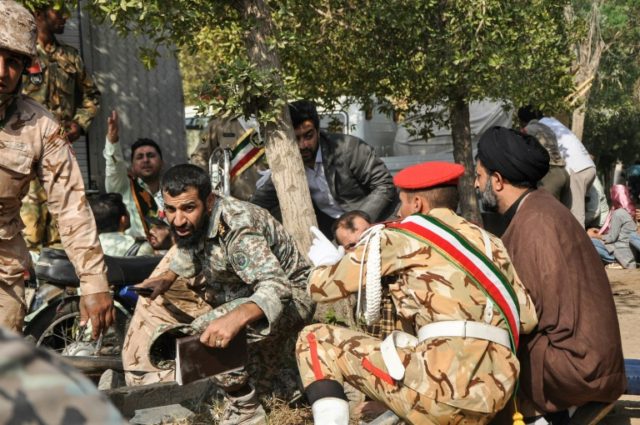The Islamic State is circulating a video that claims to show the perpetrators of the Saturday attack on a military parade in Ahvaz, Iran, that killed 25 military personnel and civilians.
Iran does not seem to believe ISIS was behind the attack, instead blaming Arab separatists it claims were funded, trained, and equipped by the United States, Israel, and Saudi Arabia.
CNN notes that the men in the video, whose authenticity could not be immediately determined, do not describe themselves as agents of ISIS. The three men are shown wearing military fatigues, sitting inside a vehicle, and discussing a “very strong guerilla operation” against the Iranian Islamic Revolutionary Guard Corps (IRGC).
“God willing, I’m going to die,” says one of the men, speaking in the dominant Iranian language of Farsi.
The video has been circulated by Amaq News Agency, the news network of the Islamic State. The attack on a parade in Ahvaz involved four gunmen who opened fire on both participants and spectators. According to Iranian authorities, the four terrorists disguised themselves as members of the IRGC and Basij militia and were all killed by security forces during the attack.
A group called the Ahvaz National Resistance also claimed responsibility for the attack, while several other separatist and dissident organizations with similar names denied they were involved.
The Ahvazi are an Arab minority group in the oil-rich Khuzestan Province. The government in Tehran launched a crackdown against alleged Ahvazi separatists in 2015.
Iran has not blamed the Islamic State for the attack, instead accusing a “triangle” of Saudi Arabia, Israel, and the United States, as IRGC acting commander Gen. Hossein Salami put it.
“All of those small mercenary countries that we see in this region are backed by America. It is Americans who instigate them and provide them with necessary means to commit these crimes,” Iranian President Hassan Rouhani said on Sunday.
The Iranian military blamed Saudi Arabia for coordinating the attack and threatened reprisals against Riyadh. The theocratic wing of the Iranian government threatened revenge attacks against the United States, Israel, Saudi Arabia, and the United Arab Emirates.
Iranian media has been reporting rumors of Ahvazi separatists traveling to Saudi Arabia, Israel, and European countries to receive military training.
The Iranian Foreign Ministry summoned European diplomats on Sunday to protest the activities of Iranian separatist groups on their soil. Foreign Minister Mohammed Javad Zarif blamed America and the Europeans for sheltering, financing, and arming separatists.
Iran’s ambassador to the United Kingdom announced he was filing a complaint with U.K. regulators over the broadcast of a television interview with an al-Ahvaziah separatist spokesperson, denouncing the interview as a “shameless” attempt to promote “terrorism and violence.”
Iran’s Supreme Leader Ayatollah Ali Khamenei called the Ahvaz attack “a continuation of the conspiracies by U.S.-backed regimes in the region.”
The IRGC claimed it found “documents” in Syria and Iraq that prove “the Americans gave orders to Riyadh and supported this attack.”
“You’ve got a lot of rhetoric coming from Rouhani. The United States condemns any terrorist attack anywhere, period. We’ve always stood by that. I think what Rouhani needs to do is he needs to look at his own home base,” U.S. ambassador to the United Nations Nikky Haley shot back at the Iranian president on Sunday.
The U.S. State Department also denounced the Ahvaz attack as “terrorism” and expressed sympathy for the Iranian people. The Washington Post found the U.S. response to the attack “muted” compared to the statements from Russia and Europe:
“The United States stands with the Iranian people and encourages the regime in Tehran to focus on keeping them safe at home,” [National Security Council spokesman Garrett] Marquis said in an email.
The State Department later offered a statement from spokeswoman Heather Nauert, who said that the U.S. government was aware of the reports of an attack. “We stand with the Iranian people against the scourge of radical Islamic terrorism and express our sympathy to them at this terrible time,” [State Department spokeswoman Heather] Nauert said.
Rouhani is in New York for the U.N. General Assembly. There has been speculation he would meet with President Trump at some point during his stay in New York, but on Monday Rouhani demanded some form of “compensation” for the U.S. withdrawing from the Iran nuclear deal before such a meeting could take place.

COMMENTS
Please let us know if you're having issues with commenting.